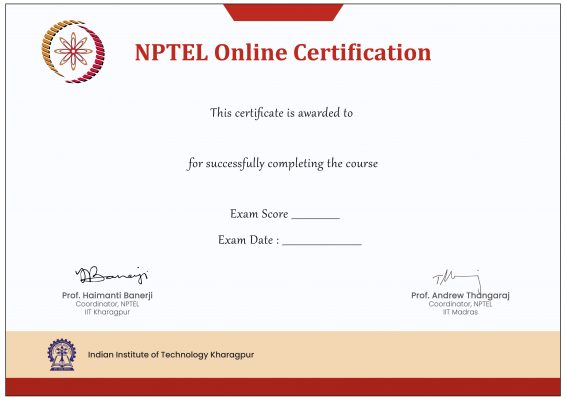Description

₹3,000.00
Prof. Hari Niwas Mishra
IIT KGP
*Additional GST and optional Exam fee are applicable.“

1. Join the course
Learners may pay the applicable fees and enrol to a course on offer in the portal and get access to all of its contents including assignments. Validity of enrolment, which includes access to the videos and other learning material and attempting the assignments, will be mentioned on the course. Learner has to complete the assignments and get the minimum required marks to be eligible for the certification exam within this period.
COURSE ENROLMENT FEE: The Fee for Enrolment is Rs. 3000 + GST
2. Watch Videos+Submit Assignments
After enrolling, learners can watch lectures and learn and follow it up with attempting/answering the assignments given.
3. Get qualified to register for exams
A learner can earn a certificate in the self paced course only by appearing for the online remote proctored exam and to register for this, the learner should get minimum required marks in the assignments as given below:
CRITERIA TO GET A CERTIFICATE
Assignment score = Score more than 50% in at least 9/12 assignments.
Exam score = 50% of the proctored certification exam score out of 100
Only the e-certificate will be made available. Hard copies will not be dispatched.”
4. Register for exams
The certification exam is conducted online with remote proctoring. Once a learner has become eligible to register for the certification exam, they can choose a slot convenient to them from what is available and pay the exam fee. Schedule of available slot dates/timings for these remote-proctored online examinations will be published and made available to the learners.
EXAM FEE: The remote proctoring exam is optional for a fee of Rs.1500 + GST. An additional fee of Rs.1500 will apply for a non-standard time slot.
5. Results and Certification
After the exam, based on the certification criteria of the course, results will be declared and learners will be notified of the same. A link to download the e-certificate will be shared with learners who pass the certification exam.
CERTIFICATE TEMPLATE:

Week 1: Introduction to food processing, preservation and quality; Basic principles & methods, water activity vs. food stability, structure-function relationship.
Week 2: Chemical changes in food during processing; Browning reactions (enzymatic and non-enzymatic), protein interactions, carbohydrate interactions.
Week 3: High pressure processing and Membrane technologies in food processing.
Week 4: Food irradiation, RF & microwave heating; Super critical fluid extraction.
Week 5: Food extrusion technology, RTE snack foods, Textured vegetable protein, Rice and dal analogues.
Week 6: Hurdle technology concept, Natural antimicrobials & bacteriocin; Freeze drying.
Week 7: Controlled atmosphere storage of food grains; ozone, microwave treatment for disinfestation of grains; Detection of spoilage in grains.
Week 8: Modified atmosphere packaging, Active packaging, and Edible coating of fruits & vegetables.
Week 9: Extraction and processing of oil; Mechanical expellers, solvent extraction, refining, hydrogenation, winterization.
Week 10: Shelf life extension of oils using natural antioxidants; Concept and measurement of rancidity.
Week 11: Microencapsulation of bioactive, and Technology of oil powder.
Week 12:Functional foods and Nutraceuticals, Ready-to-eat therapeutic food, micronutrient fortified high energy bar, gluten free bread, carbonated cereal beverage.
Books and References
1.Food Processing Technology: Principles and Practice – P. J Fellows
2.Elements of Food Technology – Norman W. Desrosier
3.Food Chemistry – Owen R. Fennema
4.Chemical changes in Food during Processing – T. Richardson & J. W. Finley
5.Principles of Food Science Part 1 : Physical Methods of Food Preservation – Owen R Fennema.
Reviews
There are no reviews yet.